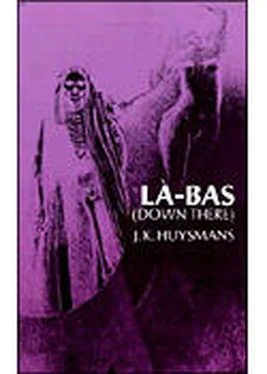Joris-Karl Huysmans - Down There (Là-Bas)
Здесь есть возможность читать онлайн «Joris-Karl Huysmans - Down There (Là-Bas)» весь текст электронной книги совершенно бесплатно (целиком полную версию без сокращений). В некоторых случаях можно слушать аудио, скачать через торрент в формате fb2 и присутствует краткое содержание. Жанр: Классическая проза, на английском языке. Описание произведения, (предисловие) а так же отзывы посетителей доступны на портале библиотеки ЛибКат.
- Название:Down There (Là-Bas)
- Автор:
- Жанр:
- Год:неизвестен
- ISBN:нет данных
- Рейтинг книги:3 / 5. Голосов: 1
-
Избранное:Добавить в избранное
- Отзывы:
-
Ваша оценка:
- 60
- 1
- 2
- 3
- 4
- 5
Down There (Là-Bas): краткое содержание, описание и аннотация
Предлагаем к чтению аннотацию, описание, краткое содержание или предисловие (зависит от того, что написал сам автор книги «Down There (Là-Bas)»). Если вы не нашли необходимую информацию о книге — напишите в комментариях, мы постараемся отыскать её.
Down There (Là-Bas) — читать онлайн бесплатно полную книгу (весь текст) целиком
Ниже представлен текст книги, разбитый по страницам. Система сохранения места последней прочитанной страницы, позволяет с удобством читать онлайн бесплатно книгу «Down There (Là-Bas)», без необходимости каждый раз заново искать на чём Вы остановились. Поставьте закладку, и сможете в любой момент перейти на страницу, на которой закончили чтение.
Интервал:
Закладка:
A whole draft of youth intoxicated him. Durtal, astonished, took a look at himself in the mirror. His tired eyes brightened, his face seemed more youthful, less worn. "Lucky I had just shaved," he said to himself. But gradually, as he mused, he saw in this mirror, which he was so little in the habit of consulting, his features droop and his eyes lose their sparkle. His stature, which had seemed to increase in this spiritual upheaval, diminished again. Sadness returned to his thoughtful mien. "I haven't what you would call the physique of a lady's man," he concluded. "What does she see in me? for she could very easily find someone else with whom to be unfaithful to her husband. Enough of these rambling thoughts. Let's cease to think them. To sum up the situation: I love her with my head and not my heart. That's the important thing. Under such conditions, whatever happens, a love affair is brief, and I am almost certain to get out of it without committing any follies."
CHAPTER IX
The next morning he woke, thinking of her, just as he had been doing when he went to sleep. He tried to rationalize the episode and revolved his conjectures over and over. Once again he put himself this question: "Why, when I went to her house, did she not let me see that I pleased her? Never a look, never a word to encourage me. Why this correspondence, when it was so easy to insist on having me to dine, so simple to prepare an occasion which would bring us together, either at her home or elsewhere?" And he answered himself, "It would have been usual and not at all diverting. She is perhaps skilled in these matters. She knows that the unknown frightens a man's reason away, that the unembodied puts the soul in ferment, and she wished to give me a fever before trying an attack-to call her advances by their right name.
"It must be admitted that if my conjectures are correct she is strangely astute. At heart she is, perhaps, quite simply a crazy romantic or a comedian. It amuses her to manufacture little adventures, to throw tantalizing obstacles in the way of the realization of a vulgar desire. And Chantelouve? He is probably aware of his wife's goings on, which perhaps facilitate his career. Otherwise, how could she arrange to come here at nine o'clock at night, instead of the morning or afternoon on pretence of going shopping?"
To this new question there could be no answer, and little by little he ceased to interrogate himself on the point. He began to be obsessed by the real woman as he had been by the imaginary creature. The latter had completely vanished. He did not even remember her physiognomy now. Mme. Chantelouve, just as she was in reality, without borrowing the other's features, had complete possession of him and fired his brain and senses to white heat. He began to desire her madly and to wish furiously for tomorrow night. And if she did not come? He felt cold in the small of his back at the idea that she might be unable to get away from home or that she might wilfully stay away.
"High time it was over and done with," he said, for this Saint Vitus' dance went on not without certain diminution of force, which disturbed him. In fact he feared, after the febrile agitation of his nights, to reveal himself as a sorry paladin when the time came. "But why bother?" he rejoined, as he started toward Carhaix's, where he was to dine with the astrologer Gévingey and Des Hermies.
"I shall be rid of my obsession awhile," he murmured, groping along in the darkness of the tower.
Des Hermies, hearing him come up the stair, opened the door, casting a shaft of light into the spiral. Durtal, reaching the landing, saw his friend in shirt sleeves and enveloped in an apron.
"I am, as you see, in the heat of composition," and upon a stew-pan boiling on the stove Des Hermies cast that brief and sure look which a mechanic gives his machine, then he consulted, as if it were a manometer, his watch, hanging to a nail. "Look," he said, raising the pot lid.
Durtal bent over and through a cloud of vapour he saw a coiled napkin rising and falling with the little billows. "Where is the leg of mutton?"
"It, my friend, is sewn into that cloth so tightly that the air cannot enter. It is cooking in this pretty, singing sauce, into which I have thrown a handful of hay, some pods of garlic and slices of carrot and onion, some grated nutmeg, and laurel and thyme. You will have many compliments to make me if Gévingey doesn't keep us waiting too long, because a gigot à l'Anglaise won't stand being cooked to shreds."
Carhaix's wife looked in.
"Come in," she said. "My husband is here."
Durtal found him dusting the books. They shook hands. Durtal, at random, looked over some of the dusted books lying on the table.
"Are these," he asked, "technical works about metals and bell-founding or are they about the liturgy of bells?"
"They are not about founding, though there is sometimes reference to the founders, the 'sainterers' as they were called in the good old days. You will discover here and there some details about alloys of red copper and fine tin. You will even find, I believe, that the art of the 'sainterer' has been in decline for three centuries, probably due to the fact that the faithful no longer melt down their ornaments of precious metals, thus modifying the alloy. Or is it because the founders no longer invoke Saint Anthony the Eremite when the bronze is boiling in the furnace? I do not know. It is true, at any rate, that bells are now made in carload lots. Their voices are without personality. They are all the same. They're like docile and indifferent hired girls when formerly they were like those aged servants who became part of the family whose joys and griefs they have shared. But what difference does that make to the clergy and the congregation? At present these auxiliaries devoted to the cult do not represent any symbol. And that explains the whole difficulty.
"You asked me, a few seconds ago, whether these books treated of bells from the liturgical point of view. Yes, most of them give tabulated explanations of the significance of the various component parts. The interpretations are simple and offer little variety."
"What are a few of them?"
"I can sum them all up for you in a very few words. According to the Rational of Guillaume Durand, the hardness of the metal signifies the force of the preacher. The percussion of the clapper on the sides expresses the idea that the preacher must first scourge himself to correct himself of his own vices before reproaching the vices of others. The wooden frame represents the cross of Christ, and the cord, which formerly served to set the bell swinging, allegorizes the science of the Scriptures which flows from the mystery of the Cross itself.
"The most ancient liturgists expound practically the same symbols. Jean Beleth, who lived in 1200, declares also that the bell is the image of the preacher, but adds that its motion to and fro, when it is set swinging, teaches that the preacher must by turns elevate his language and bring it down within reach of the crowd. For Hugo of Saint Victor the clapper is the tongue of the officiating priest, which strikes the two sides of the vase and announces thus, at the same time, the truth of the two Testaments. Finally, if we consult Fortunatus Amalarius, perhaps the most ancient of the liturgists, we find simply that the body of the bell denotes the mouth of the preacher and the hammer his tongue."
"But," said Durtal, somewhat disappointed, "it isn't-what shall I say?-very profound."
The door opened.
"Why, how are you!" said Carhaix, shaking hands with Gévingey, and then introducing him to Durtal.
While the bell-ringer's wife finished setting the table, Durtal examined the newcomer. He was a little man, wearing a soft black felt hat and wrapped up like an omnibus conductor in a cape with a military collar of blue cloth.
Читать дальшеИнтервал:
Закладка:
Похожие книги на «Down There (Là-Bas)»
Представляем Вашему вниманию похожие книги на «Down There (Là-Bas)» списком для выбора. Мы отобрали схожую по названию и смыслу литературу в надежде предоставить читателям больше вариантов отыскать новые, интересные, ещё непрочитанные произведения.
Обсуждение, отзывы о книге «Down There (Là-Bas)» и просто собственные мнения читателей. Оставьте ваши комментарии, напишите, что Вы думаете о произведении, его смысле или главных героях. Укажите что конкретно понравилось, а что нет, и почему Вы так считаете.












